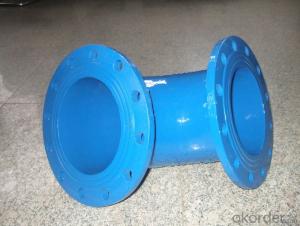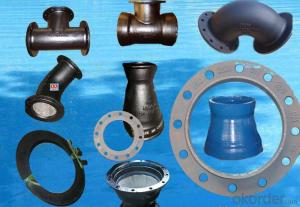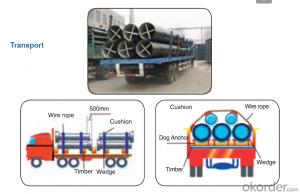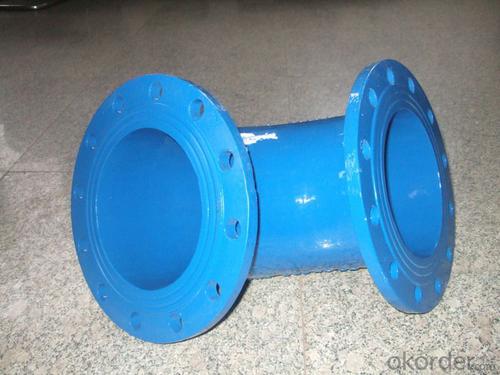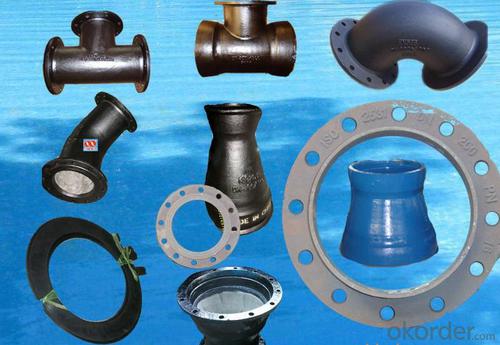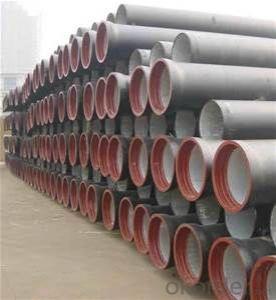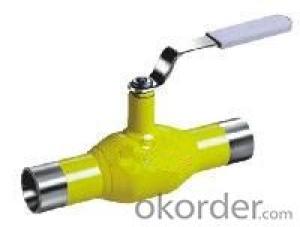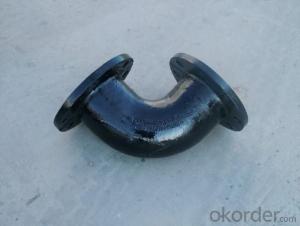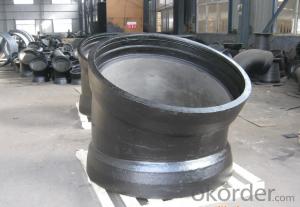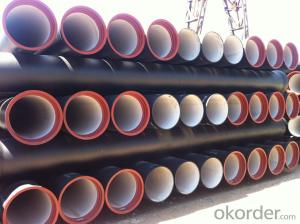Duct Iron Pipe DI Pipe ISO 2531 Double Socked 90° Bend K Type
- Loading Port:
- Tianjin
- Payment Terms:
- TT OR LC
- Min Order Qty:
- 100 m
- Supply Capability:
- 100000 m/month
OKorder Service Pledge
OKorder Financial Service
You Might Also Like
Ductile iron pipe fittings:
Dimensions standard:
ISO2531: 50-1000mm, PN10/16
BS4772: 50-1000mm, PN10/16
EN545: 50-1000mm, PN10/16
Connecting mode:
Flanged
Socketed
Mechanical connection
Loose flanged
Coatings:
Inner lined with cement and outside coated with zinc plus bitumen
Inner and outside coated with epoxy resin
Inner and outside coated with fusion bonded epoxy resin
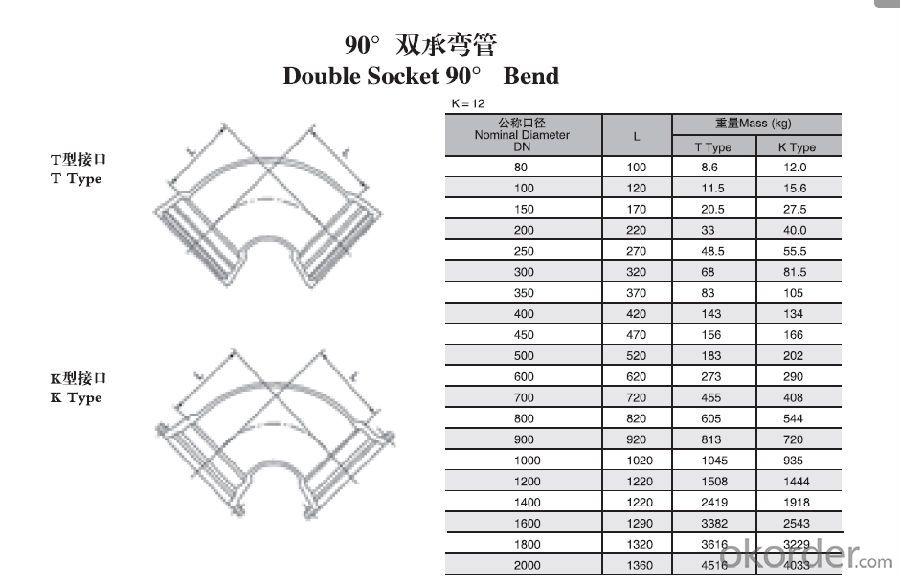
Quality:
ISO 2531 or EN 545 Standard K9 Class, K12 Class
1. ISO 9001 Certificate
2. ISO 2531 & EN 545 Certificate
3. WRAS Potable Water Certificate for FBE Internal Lining
4. WRAS EPDM Rubber Gasket or NBR Rubber Gasket
5. DN80mm - DN2000mm
6. Black Bitumen or Blue FBE / Epoxy Coating
7. Lengh = 6m or cut into 5.6m, 5.7m, 5.8m
8. Client's Brand Customization Allowable
9. Container or Bulk Loading / Shipping
10.Delivery within one Month or According to Client's Order Quantity
11. Support Client or The Third Party Inspection before Shipment
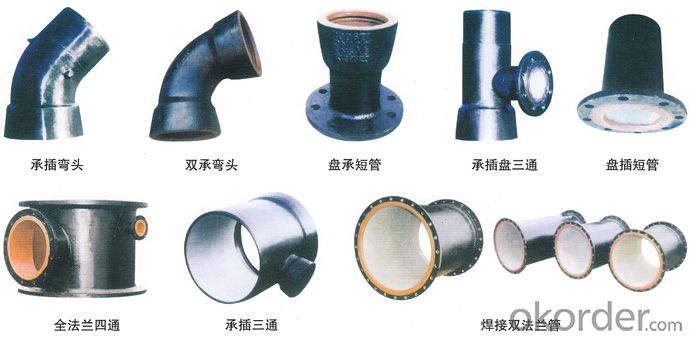
Transport:
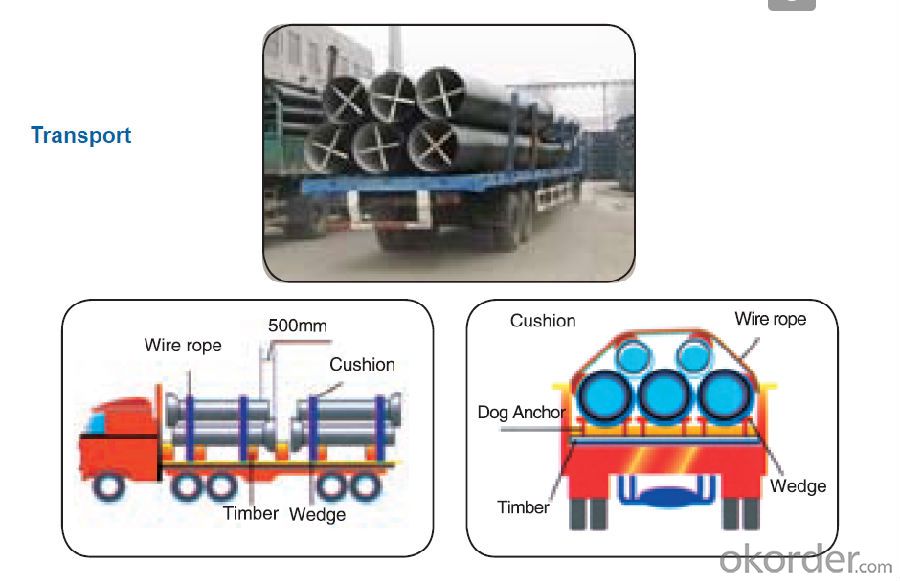
- Q: What is the maximum operating pressure for ductile iron pipes?
- The maximum operating pressure for ductile iron pipes typically ranges from 350 to 500 psi, depending on the specific diameter and class of the pipe.
- Q: Can ductile iron pipes be used for mining applications?
- Mining applications can indeed utilize ductile iron pipes. These pipes possess exceptional mechanical properties, including high tensile strength, impact resistance, and durability. As a result, they are well-suited for a range of challenging environments, including mining operations. The pipes are capable of withstanding substantial loads and pressures, making them ideal for the transportation of water, slurry, and other fluids utilized in mining processes. Moreover, ductile iron pipes have a smooth internal surface that minimizes friction and promotes the efficient flow of materials. Consequently, they find extensive use in tasks such as dewatering, tailings disposal, and the transport of corrosive or abrasive substances within the mining industry. Overall, due to their strength, durability, and suitability for demanding conditions, ductile iron pipes offer a dependable and cost-effective choice for mining applications.
- Q: Can ductile iron pipes be used in potable water systems?
- Yes, ductile iron pipes can be used in potable water systems. Ductile iron is a suitable material for water distribution systems as it has excellent durability, strength, and corrosion resistance. It is commonly used in potable water systems due to its ability to withstand high water pressure and its long service life. Additionally, ductile iron pipes are also approved by various national and international standards for use in potable water applications.
- Q: How is ductile iron pipe different from cast iron pipe?
- Ductile iron pipe and cast iron pipe are both commonly used for various plumbing and drainage applications. However, they differ in terms of their composition, strength, and flexibility. Firstly, ductile iron pipe is made from a different type of iron alloy compared to cast iron pipe. Ductile iron contains a higher percentage of carbon and silicon, which gives it enhanced strength and durability. On the other hand, cast iron pipe is made from gray iron, which has a higher carbon content but lacks the flexibility of ductile iron. Secondly, ductile iron pipe is known for its superior strength and impact resistance. It can withstand higher pressures and is less prone to cracking or breaking under heavy loads or external forces. Cast iron pipe, while strong, is more brittle and can be prone to fractures and failures. Another significant difference is the flexibility of ductile iron pipe. It has a greater degree of flexibility and can withstand bending and deformation without breaking. This flexibility allows for easier installation, especially in areas with uneven terrain or where ground movement may occur. In contrast, cast iron pipe is less flexible and more rigid, making it less suitable for certain applications where flexibility is essential. Additionally, ductile iron pipe has a smoother interior surface compared to cast iron pipe. This smoothness reduces friction, improves flow efficiency, and minimizes the accumulation of sediment and deposits within the pipe, resulting in better water flow and reduced maintenance requirements. In summary, ductile iron pipe differs from cast iron pipe in terms of its composition, strength, flexibility, and interior surface smoothness. Ductile iron offers superior strength, impact resistance, and flexibility, making it a preferred choice in various plumbing and drainage applications.
- Q: Are ductile iron pipes suitable for installation in areas with high groundwater salinity?
- Areas with high groundwater salinity are generally suitable for the installation of ductile iron pipes. Ductile iron is renowned for its resistance to corrosion, making it a favored choice for various applications, such as water and wastewater systems. High groundwater salinity refers to the increased presence of dissolved salts in the water. Although this can potentially cause corrosion in certain materials, ductile iron pipes are specifically engineered to withstand such conditions. These pipes are equipped with a protective lining, usually composed of cement mortar or polyurethane, which acts as a barrier between the pipe and its surroundings, including highly saline water. The lining serves to prevent any corrosive effects of the high groundwater salinity on the iron pipe, ensuring its long-lasting durability and reliability. Furthermore, ductile iron pipes possess a high tensile strength, enabling them to endure external loads and pressure, even in demanding environments. It is important to acknowledge that the suitability of ductile iron pipes for areas with high groundwater salinity can also be influenced by factors such as the specific levels of salinity, the presence of other corrosive agents, and the overall design and installation practices. Therefore, it is advisable to consult experts or engineers who are familiar with the local conditions in order to determine the most appropriate materials and precautions for specific installation projects.
- Q: Are ductile iron pipes suitable for pressure reducing valve stations?
- Yes, ductile iron pipes are suitable for pressure reducing valve stations. Ductile iron pipes have excellent strength and durability, making them capable of withstanding high pressure conditions. They also have good corrosion resistance, which is essential for long-term reliability in a pressure reducing valve station.
- Q: Can the underground cast iron pipes be connected with clamps to form buttress?
- Best not to, because the use of clamp connection way to connect the poor integrity of the pipeline, the base treatment is not in place or uneven settlement, it is easy to produce deformation, resulting in pipe bending deformation, easily leaked from the junction.
- Q: What is the expected corrosion protection system for ductile iron pipes?
- The expected corrosion protection system for ductile iron pipes typically includes a combination of internal and external coatings, such as cement mortar lining and an external polyethylene or epoxy coating. Additionally, sacrificial anode systems or impressed current cathodic protection may be employed to further enhance the corrosion resistance of the pipes.
- Q: Are ductile iron pipes suitable for deep burial installations?
- Yes, ductile iron pipes are suitable for deep burial installations. Ductile iron is known for its durability and strength, which makes it capable of withstanding the pressure and weight of being buried deep underground. Additionally, ductile iron is highly resistant to corrosion, which further enhances its suitability for long-term underground applications.
- Q: Can ductile iron pipes be used for underground hydropower systems?
- Indeed, underground hydropower systems can utilize ductile iron pipes. Renowned for their robustness and endurance, ductile iron pipes are apt for a wide range of purposes, including subterranean installations. With remarkable resistance against corrosion and the ability to withstand intense pressure, they are exceptionally suited for transporting water in hydropower systems. Furthermore, ductile iron pipes boast a lengthy lifespan, diminishing the necessity for frequent replacements and reducing maintenance expenses. Moreover, they exhibit excellent joint integrity, guaranteeing leak-free connections beneath the surface. Thus, ductile iron pipes emerge as a dependable option for underground hydropower systems.
Send your message to us
Duct Iron Pipe DI Pipe ISO 2531 Double Socked 90° Bend K Type
- Loading Port:
- Tianjin
- Payment Terms:
- TT OR LC
- Min Order Qty:
- 100 m
- Supply Capability:
- 100000 m/month
OKorder Service Pledge
OKorder Financial Service
Similar products
Hot products
Hot Searches
Related keywords
